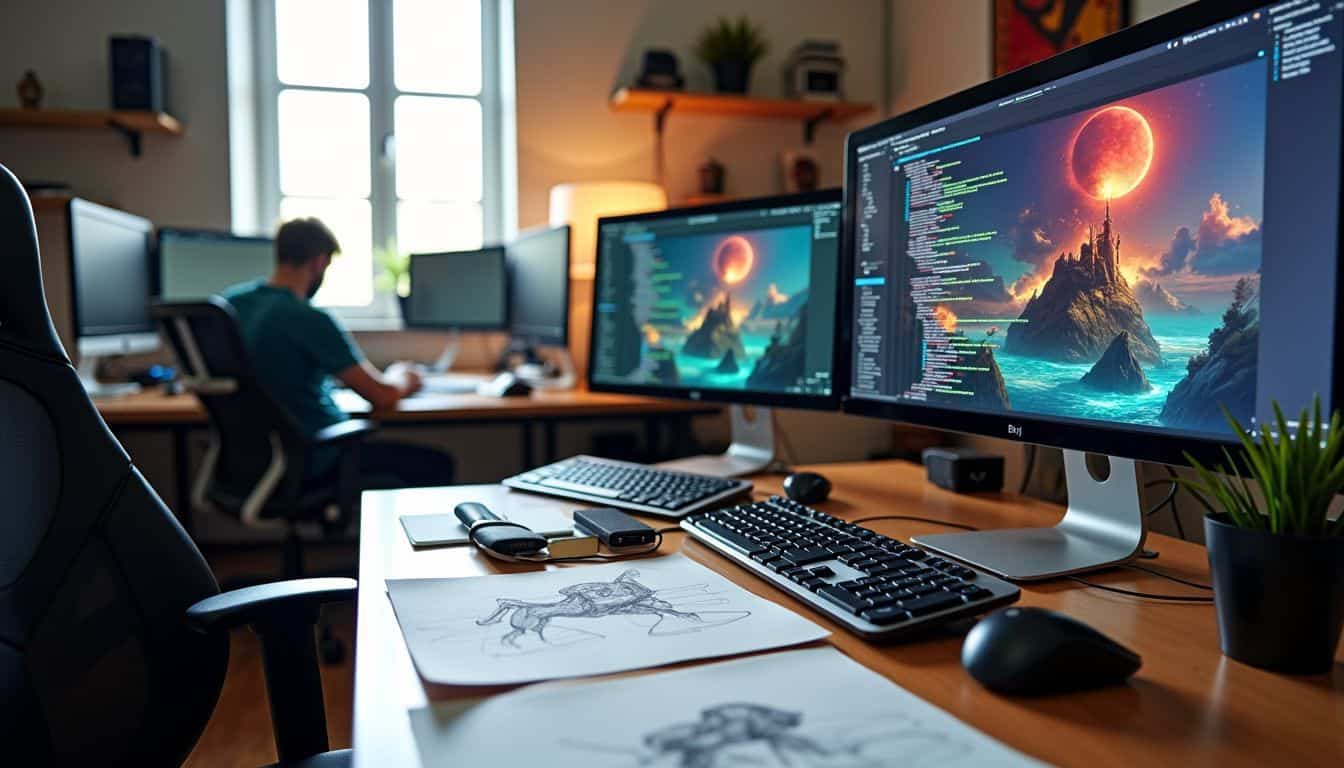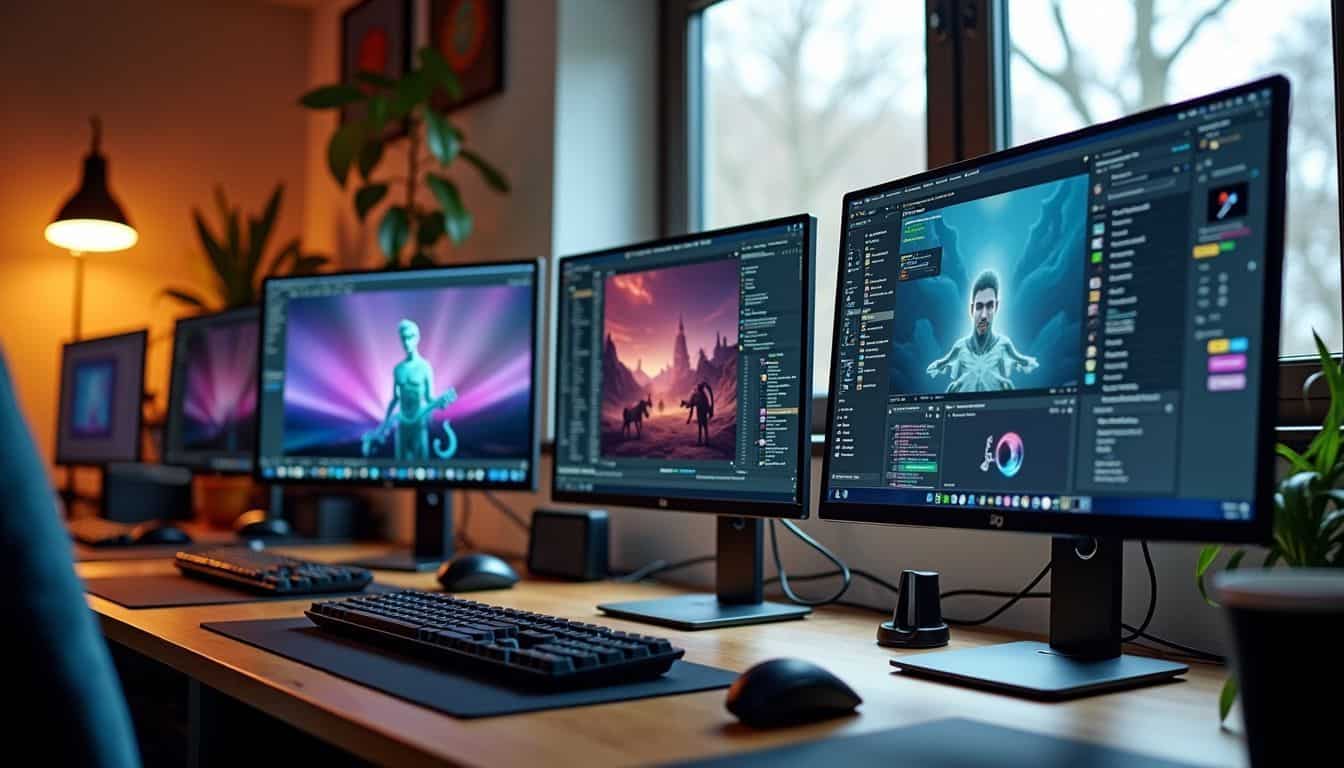Ever wondered what it takes to create those epic games you love? Video game developers are the wizards behind the curtain, bringing digital worlds to life. With nearly 3 billion gamers worldwide, these tech-savvy creatives are in high demand. 3
This article will unveil 8 epic quests that game developers tackle daily. Ready to level up your knowledge? 1 2
Key Takeaways
Video game developers create digital worlds using coding languages like C++, Python, and JavaScript, with salaries ranging from $49,000 to $85,000+.
Game devs handle various tasks including programming, story crafting, graphics design, game mechanics creation, asset development, and rigorous testing/debugging.
The gaming industry is growing rapidly, with job opportunities expected to increase by 16% from 2022 to 2032, adding over 34,700 new jobs.
Game developers can earn high salaries, with software developers and testers making an average of $124,000 annually, while special effects artists and animators earn around $98,000.
The first multi-department video game union formed in 2023, pushing for better working conditions and addressing issues like crunch time, which affects 40% of developers.
Table of Contents
The Fundamental Role of a Video Game Developer

Video game developers are the wizards behind the curtain. They bring digital worlds to life with code, creativity, and a dash of magic.
Programming Skills and Code Development

Game devs are code wizards! They breathe life into virtual worlds using languages like C++, Python, and JavaScript. It’s not just about typing gibberish – these folks need to think like computers. They craft intricate systems that make characters move, explosions boom, and scoreboards tick. Game engines like Unity and Unreal are their trusty sidekicks.
In the realm of casino game development, the stakes are even higher. Developers must ensure that games like slots, poker, and blackjack are not only engaging but also fair and secure. This involves complex algorithms for random number generation, ensuring that each spin or deal is truly random, and implementing robust security measures to protect against cheating or hacking.
Coding for games isn’t a walk in the park. Devs juggle performance, graphics, and gameplay all at once. They’re always learning new tricks to squeeze every ounce of power from consoles and PCs. This involves optimizing code to run smoothly on various hardware, from high-end gaming rigs to modest smartphones.
The challenge extends beyond mere coding; developers must also stay updated with the latest in game design trends and player expectations. This means incorporating elements like virtual reality, augmented reality, or even integrating blockchain technology for unique gaming experiences.
And let’s not forget about bugs – squashing those pesky glitches is part of the job description. Developers spend hours debugging, ensuring that the game experience is as seamless as possible. This process requires a meticulous eye for detail and a deep understanding of how different parts of the game interact.
With salaries ranging from $49,000 to $85,000+, it’s a sweet gig for tech-savvy gamers. The financial reward reflects the complexity and demand for skilled developers who can bring innovative ideas to life. Speaking of sweet deals, no KYC casinos with no ID verification are gaining traction in the online gaming world. This trend towards more accessible gaming experiences also influences game developers to think about user privacy and ease of access in their designs, adding another layer to the already multifaceted role of a game developer.
Moreover, the integration of such features into games could potentially expand the market, appealing to players who value anonymity and ease of entry into gaming platforms.
Crafting Stories and Design

Moving from coding to creativity, game developers wear many hats. They don’t just write lines of code – they weave tales and build worlds. Crafting stories and design is where the magic happens.
It’s where devs turn ideas into playable adventures. 2
Game designers sketch out plots, characters, and settings. They map out levels and create rules for gameplay. It’s a balancing act of fun and challenge. A good story hooks players and keeps them coming back.
But it’s not just about words on a page. Visuals, sound, and mechanics all work together to tell the tale. 3
In game design, every element is a brushstroke in the larger picture of player experience. – Anonymous Game Designer
Developing Graphics and Animations

Graphics and animations breathe life into video games. Game devs use tools like Python and C++++ to craft stunning visuals. 4 They’re the wizards behind every character, landscape, and special effect you see on screen.
It’s not just about making things look pretty – these pros blend art and tech to create immersive worlds.
Champlain College Online offers a degree in Game Development that digs deep into graphics and animation. This program equips future devs with the skills to bring their wildest ideas to life.
From concept art to 3D modeling, these folks learn it all. They’re the unsung heroes who make sure your jaw drops every time you fire up a new game. 5
Primary Responsibilities in Game Development

Game developers wear many hats. They juggle tasks like designing fun gameplay, creating cool characters, and squashing pesky bugs.
Designing Game Mechanics

Game mechanics design is the heart of game development. Developers create the rules and systems that make a game fun and engaging. 6 They decide how players interact with the game world, what actions they can take, and how those actions affect the game.
It’s like being the architect of a virtual playground – you set up the swings, slides, and monkey bars that players will use.
Designing game mechanics isn’t just about coming up with cool ideas. It’s about balancing fun and challenge, making sure the game is fair but not too easy. 7 Developers use math, psychology, and lots of trial-and-error to get it right.
They might spend weeks tweaking a single mechanic until it feels just right. As one famous designer put it:
“A game is a series of interesting decisions.”
Creating Game Assets

Game assets are the building blocks of virtual worlds. They’re the characters, props, and environments that bring games to life. Creating these assets is like being a digital sculptor.
You mold 3D models, paint textures, and craft animations. It’s a mix of art and tech that requires a keen eye and steady hand. 8
Artists and developers team up to make game assets shine. They use tools like Maya, Blender, or Photoshop to craft everything from tiny buttons to sprawling landscapes. Each asset needs to fit the game’s style and run smoothly on the target platform.
It’s a balancing act between looks and performance. The best assets are those players don’t even notice – they just feel right in the game world. 5
Conducting Tests and Debugging
Testing and debugging are crucial parts of game development. Developers work hard to find and fix issues before a game hits the market. 10
- QA teams jump in after production to spot bugs. They play through the game, trying to break it in every way possible. 9
- Developers use special tools to track down pesky glitches. These might include debuggers, profilers, and logging systems.
- Beta testing involves real players trying out the game. This helps catch problems that in-house testers might miss.
- Stress testing pushes the game to its limits. Developers flood servers with fake players to see how the game holds up.
- Performance testing checks how well the game runs on different devices. Frame rates, load times, and memory usage are key factors here.
- Security testing looks for ways hackers might exploit the game. This is super important for online games.
- Compatibility testing makes sure the game works on various platforms. It’s a big deal for games released on multiple systems.
- Localization testing checks if translations and cultural tweaks work right. It’s vital for games going global.
Now, let’s explore the critical skills that make a game developer successful.
Critical Skills for a Successful Game Developer

Game devs need more than just coding chops – they gotta be creative problem-solvers and team players too. Wanna know what other skills make a game dev rock? Keep reading!
Effective Communication Techniques
Game devs need to talk good. It’s not just about coding skills. Clear speaking and writing help teams work better together. 11 Producers play a big role here. They keep everyone on the same page – both inside and outside the team.
Team spirit beats rivalry in game making. When folks work as one, ideas flow better. This leads to cooler games and happier players. Good chat skills help solve problems faster too. 12 Next up, let’s look at how game makers boost their creative juices.
Enhancing Creativity
Creativity is the lifeblood of game development. It’s what turns a basic concept into a mind-blowing experience. Game devs need to think outside the box… way outside. They mix art, tech, and storytelling to craft virtual worlds that blow players’ minds.
It’s not just about coding – it’s about dreaming up new ideas and bringing them to life. 12Boosting creativity isn’t always easy, but it’s crucial. Devs often brainstorm, sketch, and prototype to spark fresh ideas. They might draw inspiration from books, movies, or real-life experiences.
Some even use AI tools to generate unique concepts. The goal? To create games that are fun, engaging, and… well, creative! 13
Creativity is intelligence having fun. – Albert Einstein
Solving Problems Efficiently
Game devs are problem-solving ninjas. They tackle bugs like bosses and crush coding challenges daily. It’s not just about writing code – it’s about thinking outside the box. These tech wizards use their sharp minds to fix glitches, optimize performance, and create smooth gameplay. 2
Efficiency is key in the fast-paced world of game development. Devs must quickly spot issues and find smart solutions. They often use tools like debuggers and profilers to pinpoint problems.
Teamwork also plays a big role. Brainstorming with fellow devs can lead to creative fixes for tricky issues. The best problem-solvers in the biz stay cool under pressure and never give up. 8
Categories of Game Developers

Game developers come in different flavors – like ice cream, but for coding! First-party, second-party, and third-party devs all bring something special to the table. Let’s dig into what makes each type tick….
Roles of First-party Developers
First-party developers are the superheroes of game companies. They work exclusively for big names like Nintendo or Sony, creating games just for their consoles. 14 These devs are the secret sauce behind hit titles that make gamers drool.
They know the ins and outs of their company’s hardware, squeezing every ounce of power from it. 5
First-party devs are the heart and soul of console gaming. – Industry Veteran
These wizards save their bosses tons of cash. How? By cutting out royalty payments to outside studios. 14 It’s a win-win! The company gets awesome games, and the devs get steady work.
Plus, they often get first dibs on cool new tech. Talk about job perks!
Function of Second-party Developers
Second-party developers are the unsung heroes of the gaming world. They’re not part of big console makers, but they’re not totally free agents either. These devs have special deals with platform holders like Nintendo or Sony.
They make games that you can only play on specific consoles. It’s a sweet gig – they get the perks of working with big names, but keep their own identity. 5
Take Game Freak, for example. They’re the brains behind Pokémon. Or Good-Feel, who gave us Yoshi’s Woolly World. These studios aren’t owned by Nintendo, but they make games just for Nintendo systems.
It’s a win-win. The console gets cool exclusive games, and the developers get a steady stream of work. Plus, they often get extra support from the big guys. It’s like having a backstage pass to the coolest tech in gaming. 15
Contributions of Third-party Developers
Third-party developers are the unsung heroes of the gaming world. These indie studios and freelance coders bring fresh ideas to life, often taking big risks on new concepts. Activision blazed the trail as the first third-party dev back in the day, setting up the licensing fee model we know today. 14 Now, many of these creative powerhouses end up joining forces with major publishers, becoming in-house teams while keeping some of their independent spirit.
These developers are the secret sauce that keeps the gaming industry spicy. They’re not tied to one console or company, so they can spread their magic across different platforms. This freedom lets them push boundaries and try out wild new gameplay ideas.
Plus, they often fill gaps in game libraries that first-party devs might miss. 5 Next up, let’s dive into the work environment these coding wizards call home.
Work Environment for Video Game Developers

Game devs don’t always have it easy. Long hours and tight deadlines can make for a tough gig – but things are changing.
Addressing Quality of Life
Game devs care about your fun… and their sanity! Quality of Life (QoL) features make games smoother without messing with the core gameplay. It’s like adding comfy seats to a rollercoaster – the thrill’s the same, but your butt thanks you.
Devs spot these QoL needs through tons of playtesting. 16 They’re the unsung heroes who make sure you’re not tearing your hair out over tiny annoyances.
Think of QoL as the secret sauce that keeps you glued to your screen. It’s the stuff that lets you focus on slaying dragons instead of battling menus. Devs work hard to make games easier to play, not easier to win. 17 They’re always on the lookout for ways to cut out the boring bits and amp up the fun. It’s a tricky balance, but when they nail it, you probably won’t even notice – and that’s the point!
Managing Crunch Time
Crunch time in game dev is no joke. It’s a tough period when teams work crazy hours to finish a game. Sadly, it’s super common. A whopping 40% of devs faced crunch at least once last year. 18 That’s a lot of late nights and missed family time!
Here’s the kicker – only 8% of devs got extra pay for those long hours. 18 Yikes! Some studios use legal loopholes to skip overtime pay during crunch. It’s not cool, but it happens.
Devs are pushing back, though. They’re speaking up about work-life balance and fair pay. Some are even joining unions to fight for better conditions. The industry’s changing, slowly but surely. 19
Progress in Unionization
Game devs are joining forces! In 2023, the first multi-department video game union was born. 20 It’s a big deal for the industry. Workers now have a stronger voice to fight for better pay, job security, and safer workplaces.
The Campaign to Organize Digital Employees (CODE) kicked off in January 2020, paving the way for this milestone.
Unions are shaking up the gaming world. They’re giving devs the power to bargain as a team. This means more say in work hours, pay, and even how games are made. It’s not just about money – it’s about creating a fair and fun workplace for everyone.
As more devs unite, we might see some epic changes in how our favorite games come to life. 21
Steps to Becoming a Video Game Developer

Wanna level up your career and become a video game dev? It’s not all fun and games… but it’s pretty close! Grab your controller and let’s explore the epic quest to join this exciting industry.
Ready player one?
Academic and Training Requirements
Game dev hopefuls, listen up! You don’t always need a fancy degree to make it big. But… a bachelor’s in software engineering or something similar can give you a leg up. Champlain College Online offers a great Bachelor of Science in Game Development – perfect for improving your skills.
And hey, if you’re short on time but have some IT experience under your belt, check out the Web Application Deployment and Support Certificate. It’s a quick 5-month program that’ll boost your resume faster than you can say “respawn.” 22
Want to become a game developer? Start by picking up programming languages like C++ or Java. Then, learn game engines like Unity or Unreal.
Don’t forget to build a great portfolio – it’s your ticket to impressing potential employers. And keep in mind, the gaming world changes quickly. Stay on top of new tech and trends to keep your skills sharp.
It’s a challenging industry, but with passion and hard work, you could be the brains behind the next big hit! 23
Certifications Needed
Game devs, listen up! You need some sweet certs to level up your career. Unity Certified Programmer is a must-have badge for $349. 24 It’s like beating a boss level – you’ll need mad C# skills and Unity know-how.
But wait, there’s more! Unity Certified 3D Artist is another gem for your collection. It’ll prove you can craft jaw-dropping 3D worlds.
Want to be a project management wizard? Grab that Certified Scrum Master (CSM) title. It’ll set you back $995 to $1,395, but it’s worth every penny. You’ll learn the ways of Scrum in a two-day crash course.
These certs aren’t just fancy paper – they’re your ticket to bigger, better game dev gigs. 22 So, start grinding those skills and add these achievements to your inventory!
Developing a Professional Game Portfolio
Creating an impressive game portfolio is crucial for aspiring developers. Start small – make mini-games or join game jams. These projects highlight your skills and creativity… and they’re fun! 25 Be sure to showcase your best work online.
GitHub’s a great place to share your code.
Internships and freelance gigs are valuable for your portfolio. They provide real-world experience and industry connections. Baker College offers an exciting bachelor’s degree in Game Software Development. 25 It’s an excellent way to learn the essentials and build your portfolio simultaneously. 22 Your portfolio is your gateway to the game development industry – make it stand out!
Career Prospects in Game Development

Game dev careers are booming! Jobs in this field are growing faster than a speedrunner’s completion time. Plus, the pay’s not too shabby – you might just level up your bank account.
Future Job Market
The future job market for video game developers looks bright. With the gaming industry set to hit $257 billion by 2025, opportunities are booming. 26 Jobs in this field are growing fast – 16% from 2022 to 2032.
That’s way above average! It means over 34,700 new jobs will pop up. 27
Tech is changing the game… literally. AI and machine learning are becoming essential skills for developers. They’re used to create smarter enemies, better graphics, and more realistic worlds.
As a geek, you’ll enjoy exploring these cutting-edge tools. It’s like improving your own skills while making awesome games. The future of game dev is full of exciting challenges and cool tech to master.
Expected Salaries
Moving from job prospects to the nitty-gritty of paychecks, let’s talk dollars and cents. Game devs earn a lot, but how much exactly? Time to level up your salary knowledge! 29
| Role | Average Annual Salary |
|---|---|
| Entertainment/Video Game Software Developer | $91,000 |
| Software Developer and Tester | $124,000 |
| Special Effects Artist and Animator | $98,000 |
| Computer Programmer | $97,000 |
| Web Developer and Digital Designer | $80,000 |
Holy moly! Those numbers are no joke. Software devs and testers rake in the big bucks at $124k a year. Not too shabby, huh?Special effects wizards and animators aren’t far behind, pocketing a cool $98k. Computer programmers are nipping at their heels with $97k. Even web devs and digital designers, the “lowest” on this list, still bring home $80k annually. That’s way above the national average, folks! 28
But here’s the kicker – these are just averages. Your actual paycheck? It’ll depend on your skills, experience, and which studio you land in. Plus, don’t forget about those sweet, sweet bonuses some companies dish out. Ka-ching!
So, ready to jump into game dev? With salaries like these, it’s not just about the love of the game anymore… though that’s still pretty important. Time to start coding and watch those dollar signs roll in!
Exploring Related Careers
Game devs can branch out into cool related fields. VR and AR are hot right now – imagine crafting virtual worlds or augmented experiences! 31 AI is another exciting area. You could design smart NPCs or create game-changing algorithms.
If you love the tech side, software engineering or web development might be your jam. These skills transfer well from game dev. For the artsy types, 3D modeling or animation could be a perfect fit.
Your game art chops would shine here!
Don’t forget about the business side of gaming. Project management, marketing, or even starting your own indie studio are solid options. The skills you pick up as a game dev – problem-solving, teamwork, creativity – are super valuable in many careers.
So if you ever want to switch gears, you’ve got plenty of awesome paths to explore! 30
People Also Ask
What’s the day-to-day grind like for a video game developer?
A game dev’s life is a wild ride! They juggle coding, crafting virtual worlds, and breathing life into characters. One day they’re knee-deep in computer programming, the next they’re fine-tuning AI for smarter enemies. It’s a mix of tech wizardry and creative magic.
Do video game developers need to know about fancy tech stuff?
You bet! They’re swimming in a sea of tech lingo. From NoSQL databases to React frameworks, developers need to stay sharp. They often use tools like Ruby on Rails or dive into the Document Object Model. It’s like being a tech polyglot in the gaming world.
How’s the job market looking for game developers?
The field’s as hot as a freshly overclocked CPU! With big players like Blizzard Entertainment and Ubisoft always on the hunt, opportunities abound. But watch out – the industry can be as unpredictable as a boss fight. Layoffs happen, so it’s smart to keep your skills polished.
What about diversity in game development?
It’s leveling up! The industry’s pushing for more diversity, welcoming folks from all walks of life. Women in video games are making waves, and LGBT themes are popping up more. It’s not perfect yet, but the push for inclusivity is gaining XP fast.
Are game developers joining unions?
You’re onto something! Some devs are banding together like a party in an RPG. Groups like Game Workers Unite are fighting for better working conditions. It’s like a real-life quest for fair play in the industry.
How’s AI changing the game development scene?
AI’s the new power-up in town! It’s revolutionizing how games are made and played. Developers are using AI to create smarter NPCs, generate content, and even predict player behavior. It’s like having a super-smart sidekick in the development process.
References
^ https://www.cgspectrum.com/career-pathways/game-programmer
^ https://medium.com/@7019727855a/the-rigorous-journey-of-game-development-challenges-and-triumphs-623c7411d2d3
^ https://online.champlain.edu/blog/video-game-designer-vs-game-developer
^ https://online.champlain.edu/blog/how-become-video-game-developer (2024-03-22)
^ https://www.coursera.org/articles/game-developer (2024-02-23)
^ https://www.researchgate.net/publication/236168267_Gameplay_and_game_mechanics_design_a_key_to_quality_in_videogames
^ https://kevurugames.com/blog/what-is-game-design-or-welcome-to-the-game-designers-backstage-rates-mistakes-and-victory-conditions-detailed-game-design-document-template/ (2023-03-30)
^ https://targetjobs.co.uk/careers-advice/job-descriptions/video-game-developer-job-description (2023-11-21)
^ https://devotedstudios.com/what-is-game-development-everything-you-need-to-know/
^ https://uk.indeed.com/career-advice/finding-a-job/what-does-a-game-developer-do
^ https://www.gamedev.net/tutorials/business/production-and-management/communication-is-a-game-development-skill-r3800/ (2014-09-11)
^ https://www.researchgate.net/publication/221643995_Critical_skills_for_game_developers_an_analysis_of_skills_sought_by_industry
^ https://myweb.fsu.edu/vshute/pdf/rahimi_shute.pdf
^ https://en.wikipedia.org/wiki/Video_game_developer
^ https://nintendo.fandom.com/wiki/Category:Second_party_developers
^ https://medium.com/super-jump/playability-in-game-design-310e94c4e88e
^ https://djmmtgamechangerdoc.wordpress.com/2020/09/30/prioritize-quality-of-life-functions-in-game-development/ (2020-09-30)
^ https://www.washingtonpost.com/video-games/2021/03/24/crunch-laws/ (2021-03-24)
^ https://www.runn.io/blog/crunch-time-in-game-development (2022-11-18)
^ https://wjlta.com/2024/01/14/2023-a-roller-coaster-towards-unionization-for-game-developers/ (2024-01-14)
^ https://www.polygon.com/23485977/video-game-unions-guide-explainer
^ https://www.wgu.edu/career-guide/information-technology/video-game-developer-career.html
^ https://www.indeed.com/career-advice/career-development/how-to-become-a-game-developer (2024-07-15)
^ https://www.tealhq.com/certifications/game-developer
^ https://www.baker.edu/about/get-to-know-us/blog/how-to-become-a-game-developer/
^ https://moldstud.com/articles/p-game-development-job-market-current-trends-and-insights (2024-02-14)
^ https://www.icscareergps.com/blog/latest-education-and-career-buzz/career-prospects-in-game-development/
^ https://www.forbes.com/advisor/education/it-and-tech/how-to-become-a-video-game-developer/
^ https://wifitalents.com/statistic/game-developer-salary/
^ https://www.cgspectrum.com/career-pathways/game-development
^ https://8bitplay.com/blog/8_top_jobs_in_game_dev_explained/ (2022-08-18)


